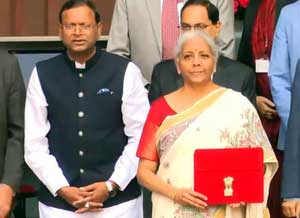Union Finance Minister Nirmala Sitharaman on Saturday announced PM Dhan Dhanya Krishi Yojana, that will benefit 1.7 crore farmers.
The PM Dhan Dhanya Krishi Yojana will enhance agricultural productivity, adopt crop diversification, augment post-harvest storage at panchayat and block levels, bolster irrigation and improve availability of short and long-term credit.
“PM Dhan Dhanya Krishi Yojana will benefit 1.7 crore farmers and aims to create ample opportunity for rural areas so that migration becomes an option, not a necessity," the Finance Minister noted.
With the rising income levels, consumption of vegetables and fruits are increasing across the country.
"The government is working towards achieving self-sufficiency in pulses. Consumption of pulses has increased significantly, and the government will launch a 6-year mission for self-sufficiency in pulses. A comprehensive programme for vegetables, fruits would be launched," said FM Sitharaman.
She also announced to set up a Makhana Board in Bihar.
To further augment urea supply, a plant with annual capacity of 12.7 lakh metric tonnes will be set up in Assam.
The Finance Minister also listed 10 broad areas focussing on the poor, youth, farmers and women.
The Budget Session of Parliament, which commenced on Friday, will be conducted in two phases - the first started on January 31 and will conclude on February 13, while the second phase will begin on March 10 and end on April 4.
The economic survey has also highlighted that rising private consumption is playing a key role in helping India's domestic economy remain steady amid global uncertainties.




New Urban Community Health Centre to reduce patients rush in GBP Hospital: CM Dr Manik Saha
Chief Minister Dr Manik Saha on Thursday laid foundation stone of 50-bed Urban Community Health Center here at Agartala and said that the present government is working diligently to improve health infrastructure and services in the state.
Govt determined to develop sports infrastructure in Tripura: CM Dr Manik Saha
Chief Minister Dr Manik Saha on Thursday inaugurated football turf, athletics track and hockey ground here at Agartala Dasarath Deb Sports Complex at Badharghat and said that the government is determined to develop facilities and platform for sports persons in the state.
Mistake that benefits no one: World leaders react to Trump's 'reciprocal tariffs'
As US President Donald Trump signed an executive order on the so-called "reciprocal tariffs," the world reacted sharply against the decision, with some calling it a "mistake that benefits no one" while others called it a violation of Washington's obligations under the World Trade Organization (WTO).
Indian pharmaceutical exports get reprieve from Trump’s reciprocal tariffs
Because of the importance of India’s pharmaceuticals to US healthcare, those exports will get a reprieve from President Donald Trump’s reciprocal tariffs, according to the White House.
India stands less impacted by Trump tariffs than global peers: Industry
As US President Donald Trump announced reciprocal tariffs on dozens of countries, including India, industry experts said on Thursday that it appears India's export competitiveness to the US market stands far less impacted on a relative basis compared to global peers.
IAF pilot killed, another critical as Jaguar fighter jet crashes in Gujarat
An Indian Air Force (IAF) pilot lost his life, while another sustained critical injuries after their two-seater Jaguar fighter jet crashed near Gujarat's Jamnagar Airfield, the IAF confirmed on Thursday.
PM Modi emplanes for Thailand; to attend BIMSTEC summit
Prime Minister Narendra Modi on Thursday emplaned for Thailand on a state visit to attend the 6th BIMSTEC Summit, with his visit also set to bolster bilateral relations between New Delhi and Bangkok.
Bhavan’s Little Learners celebrate annual programme
The Bhavan’s Little Learners, Bordowali celebrated annual programme and organised prize distribution ceremony here at Agartala Rabindra Satabarshiki Bhavan on Wednesday.